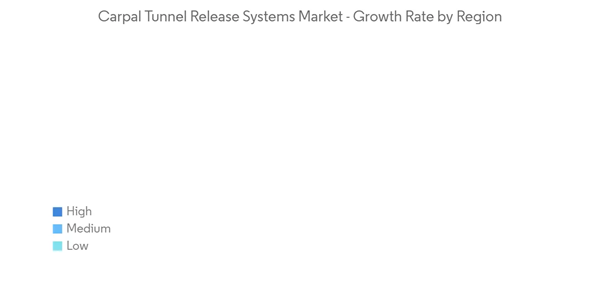The COVID-19 pandemic had a significant impact on the growth of the market studied. According to a Clarity Medical article published in February 2022, carpal tunnel syndrome, dry eye syndrome, repetitive stress injuries, cervical spondylitis, and sleep disorders are common, affecting nearly 30% of those working from home for the first time. Thus, the high incidence of carpal tunnel syndrome during the pandemic had a significant impact on the market. As per an NCBI article published in August 2021, peripheral microangiopathy involving nerve supply, viral demyelination, or an immune-mediated irritating antigenic stimulus on synovial sheaths after COVID-19 infection may all induce a carpal, cubital, or tarsal tunnel syndrome of the variable entity in genetically predisposed subjects associated with myxoid nerve degeneration. According to the source mentioned above, carpal tunnel syndrome may result in reactive arthritis after COVID-19 infection recovery due to irritation and, in turn, requiring decompressive surgery. These factors are expected to have a significant impact on the market during the COVID-19 pandemic.
Carpal tunnel syndrome (CTS) is a collection of characteristic symptoms and signs following compression of the median nerve within the carpal tunnel. Factors driving the market's growth are the increasing prevalence of CTS, lower procedure costs, and improved medical reimbursement coverage for CT surgeries. According to an Up-to-date article published in August 2021, carpal tunnel syndrome is a common disorder with an estimated prevalence of 1% and 5% among the general population. CTS is more frequent in females, with a female-to-male ratio of 3 to 1. In a Mayo Clinic article published in February 2022, CTS is an entrapment neuropathy caused by compression of the median nerve as it travels through the wrist's carpal tunnel. It is the most common nerve entrapment neuropathy, accounting for 90% of all neuropathies. In the United States, CTS has an incidence of 1 to 3 persons per 1000 per year, with a prevalence of 50 per 1000, with similar incidence and prevalence in most developed countries. Carpal tunnel syndrome does not cause mortality but can lead to irreversible median nerve damage, with severe loss of hand function, if not treated. Therefore, the prevalence of carpal tunnel syndrome among the global population is expected to contribute to the growth of the market.
However, a lack of awareness about CTS in developing nations and expensive surgical procedures are anticipated to impede the expansion of market participants.
Carpal Tunnel Release Systems Market Trends
Open Carpal Tunnel Release System
Open carpal tunnel release systems are the commonly accepted methods. These systems are widely accepted as they enable direct visualization, the reliable vision of the flexor retinaculum, and the ability to identify anatomical variations. As per an NCBI article published in June 2022, CTS is the most frequently encountered compressive neuropathy, with a reported prevalence of 3.8% in the general population. Mini-open carpal tunnel release (MCTR) combines the advantages of single- or double-portal techniques and has been reported to have low complication rates. Open carpal tunnel release is preferred to avoid these complications after the surgery, thereby contributing to the growth of the segment studied.According to the American Association for Hand Surgery, data published in 2021 in a study conducted by the association resulted that 34% of respondents favored a standard open (extensile) incision, 46% favored a mini-open incision, and 20% preferred an endoscopic approach. Thus, the preference for open carpal tunnel release systems by patients is expected to drive the segment's growth in the market. As per an NCBI article published in June 2022, even though this treatment allows for direct viewing, dependable flexor retinaculum separation, and the detection of anatomical differences, it also carries the risk of postoperative wound pain, scar sensibility, and pillar pain. The most frequently used approach is known as open carpal tunnel release (OCTR), and this trend is expected to accelerate the demand for open carpal tunnel release system procedures.
Therefore, factors such as the rising adoption of open carpal tunnel release systems and the efficacy of these systems are expected to drive the segment's growth during the forecast period.
North America
North America dominates the carpal tunnel release systems products market primarily due to high awareness regarding carpal tunnel syndrome. The rising prevalence of carpal tunnel syndrome is also fueling the market's growth across the region.According to the Mayoclinic article published in 2020 in the United States, carpal tunnel syndrome has an incidence of 1 to 3 persons per 1000 per year, with a prevalence of 50 per 1000. Similar incidences and prevalence have been observed in most developed countries. It commonly affects white people, has up to a 10 to 1 predominance in females, and has a peak age of 46 to 60. As per an NCBI article published in July 2022, carpal tunnel syndrome (CTS) is widely regarded as the most common compressive neuropathy. In the United States, an incidence of 1-3 per 1,000 people and a prevalence of 50 per 1,000 individuals have been reported. The detected years are between the ages of 45 and 54 for the syndrome, and women are three times more likely to be afflicted by CTS than males. CTS is often listed as an occupational hazard, with the United States Department of Labor and Statistics reporting the occupational incidence rate of CTS to be 0.5 per 10,000 workers. Thus, the increasing incidence of carpal tunnel syndrome in the United States is expected to drive the market's growth in the region.
According to Statistics Canada data published in 2022, repetitive strain injuries affect about 15% of Canadians, which is about 4.5 million people. In the case of carpal tunnel syndrome, the symptoms usually start gradually. Hence, the expected increase in the disorder is expected to improve and expand the market's growth in the country and region. As per an NCBI article published in July 2022, in the United States, the medical costs related to the diagnosis and treatment of CTS can be as high as USD 13,000 per surgical case and upwards of USD 40,000 annually for nonoperative cases. Such expenditure on carpal tunnel syndrome treatment in the United States is expected to rise, driving the market's growth during the forecast period.
Therefore, the above-mentioned factors, high awareness regarding carpal tunnel syndrome, and quick adoption of advanced systems are expected to drive the market's growth in the region during the forecast period.
Carpal Tunnel Release Systems Market Competitor Analysis
The global carpal tunnel release systems market is moderately competitive and consists of several major players. Companies like AM Surgical Inc., Arthrex Inc., CONMED Corporation, Integra LifeSciences Corporation, Medical Designs LLC, MicroAire Surgical Instruments LLC., Smith & Nephew plc, Stryker Corporation, Trice Medical, among others, hold substantial market share.Additional benefits of purchasing the report:
- The market estimate (ME) sheet in Excel format
- 3 months of analyst support
This product will be delivered within 2 business days.
Table of Contents
Companies Mentioned (Partial List)
A selection of companies mentioned in this report includes, but is not limited to:
- AM Surgical Inc.
- Arthrex Inc.
- CONMED Corporation
- Integra LifeSciences Corporation
- Medical Designs LLC
- MicroAire Surgical Instruments LLC
- Smith & Nephew PLC
- Stryker Corporation
- Trice Medical
- SEG Way Orthopaedics Inc.
- Sonex Health LLC










